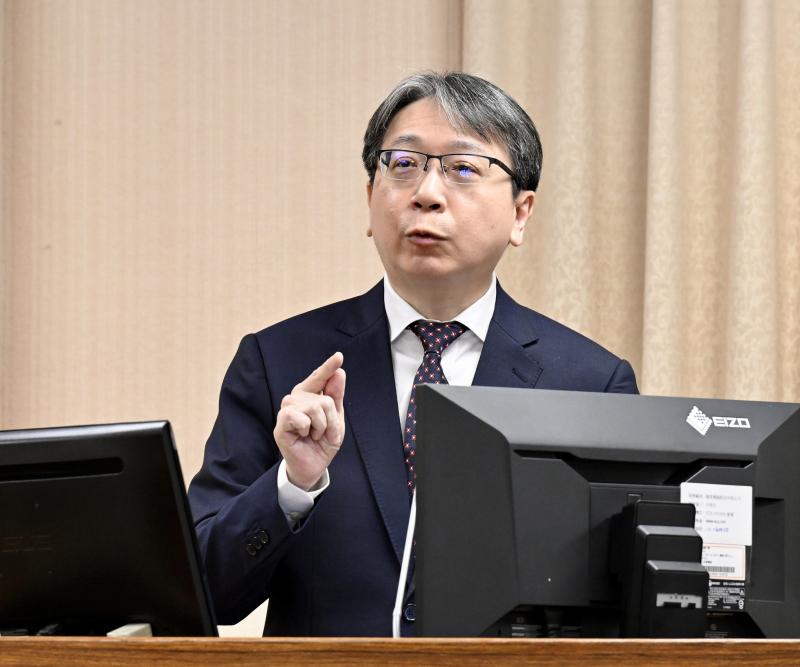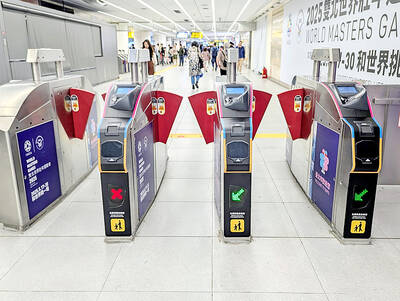Beijing is aiming for “peaceful unification by coercion” by instilling fear of military action among Taiwanese, National Security Bureau Director-General Tsai Ming-yen (蔡明彥) said on Monday.
Tsai was speaking at a meeting of the legislature’s Foreign and National Defense Committee about the Chinese Communist Party’s (CCP) annual “two sessions,” which conclude on Monday, and the upcoming US presidential election.
Much attention was given to the omission of the word “peaceful” when describing China’s designs on unification with Taiwan from the government work report delivered by Chinese Premier Li Qiang (李強) on Tuesday last week.

Photo: Lo Pei-de, Taipei Times
At later meetings, Chinese President Xi Jinping (習近平) and Chinese Minister of Foreign Affairs Wang Yi (王毅) reinserted “peaceful” into their discussions of Taiwan.
However, Tsai told legislators that the discussion does not accurately reflect CCP tactics toward Taiwan.
Beijing is seeking “peaceful unification by coercion” by using a variety of measures — including military, economic, political, information and cognitive warfare — to make Taiwanese fear the potential of military action, Tsai said.
Although the purpose is to intimidate, the tactics still follow the thread of “peaceful unification,” he said.
In the face of complex challenges, the bureau works with defense and national security units as well as international partners to closely watch Chinese military plans, he added.
“At the moment, we have not identified any intelligence to indicate that tensions in the Taiwan Strait will continue to rise,” he said.
Under Xi, the “two sessions” have become mainly ceremonial, serving as policy declaration, but lacking substantive action, Tsai said.
Additional reporting by CNA

A magnitude 6.4 earthquake struck off the coast of Hualien County in eastern Taiwan at 7pm yesterday, the Central Weather Administration (CWA) said. The epicenter of the temblor was at sea, about 69.9km south of Hualien County Hall, at a depth of 30.9km, it said. There were no immediate reports of damage resulting from the quake. The earthquake’s intensity, which gauges the actual effect of a temblor, was highest in Taitung County’s Changbin Township (長濱), where it measured 5 on Taiwan’s seven-tier intensity scale. The quake also measured an intensity of 4 in Hualien, Nantou, Chiayi, Yunlin, Changhua and Miaoli counties, as well as

Credit departments of farmers’ and fishers’ associations blocked a total of more than NT$180 million (US$6.01 million) from being lost to scams last year, National Police Agency (NPA) data showed. The Agricultural Finance Agency (AFA) said last week that staff of farmers’ and fishers’ associations’ credit departments are required to implement fraud prevention measures when they serve clients at the counter. They would ask clients about personal financial management activities whenever they suspect there might be a fraud situation, and would immediately report the incident to local authorities, which would send police officers to the site to help, it said. NPA data showed

ENERGY RESILIENCE: Although Alaska is open for investments, Taiwan is sourcing its gas from the Middle East, and the sea routes carry risks, Ho Cheng-hui said US government officials’ high-profile reception of a Taiwanese representative at the Alaska Sustainable Energy Conference indicated the emergence of an Indo-Pacific energy resilience alliance, an academic said. Presidential Office Secretary-General Pan Men-an (潘孟安) attended the conference in Alaska on Thursday last week at the invitation of the US government. Pan visited oil and gas facilities with senior US officials, including US Secretary of the Interior Doug Burgum, US Secretary of Energy Chris Wright, Alaska Governor Mike Dunleavy and US Senator Daniel Sullivan. Pan attending the conference on behalf of President William Lai (賴清德) shows a significant elevation in diplomatic representation,

The Taipei MRT is to begin accepting mobile payment services in the fall, Taipei Rapid Transit Corp said on Saturday. When the company finishes the installation of new payment units at ticketing gates in October, MRT passengers can use credit cards, Apple Pay, Google Pay and Samsung Pay, the operator said. In addition, the MRT would also provide QR payment codes — which would be compatible with Line Pay, Jkopay, iPass Money, PXPay Plus, EasyWallet, iCash Pay, Taiwan Pay and Taishin Pay — to access the railway system. Currently, passengers can access the Taipei MRT by buying a single-journey token or using EasyCard,